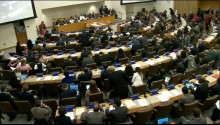As an historic nuclear weapons treaty is reached, G20 leaders miss the mark on North Korea
On 7 July 2017, more than 120 countries adopted a treaty at a UN conference that prohibits the production, stockpiling, use or threatened use of nuclear weapons or other nuclear explosive devices. Australia was a notable absentee. So were the nine countries that possess nuclear weapons.
While the UN conference was taking a major step toward the elimination of nuclear weapons, the US and its allies – notably Japan, South Korea and Australia – were hoping to use the G20 summit in Hamburg to focus attention on the danger North Korea’s nuclear ambitions pose.
The glaring contradiction between the boycott of the nuclear ban negotiations and the preoccupation with the North Korean nuclear threat does not seem to have dawned on the US and its allies.
Put simply, the treaty is a comprehensive effort to bring the rule of law to bear on all aspects of the nuclear assault on the planet. It designates a nuclear-weapon-free world as “a global public good of the highest order”, on which depend:
… human survival, the environment, socioeconomic development, the global economy, food security and the health of current and future generations.

